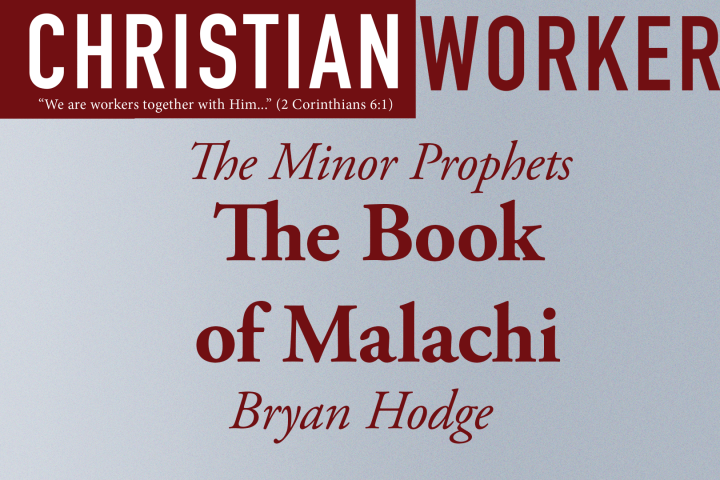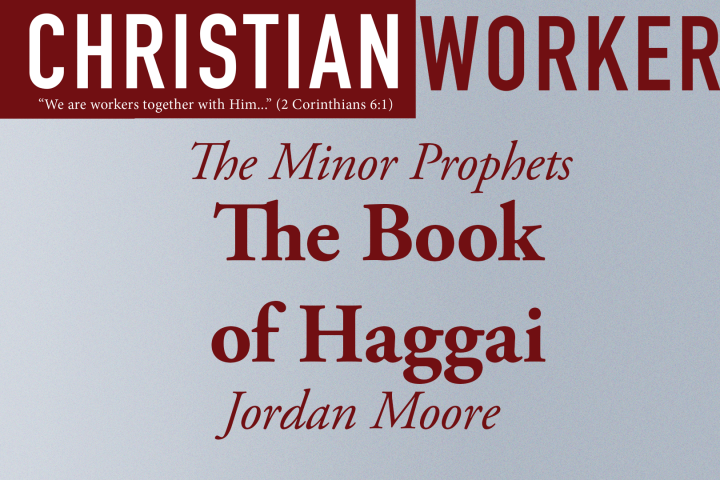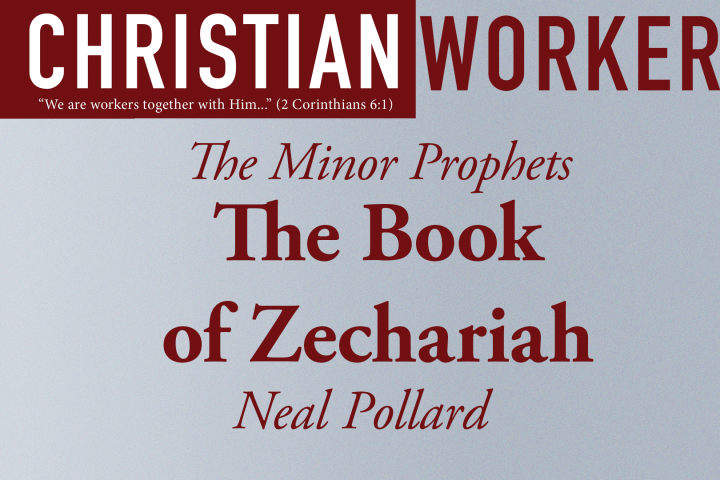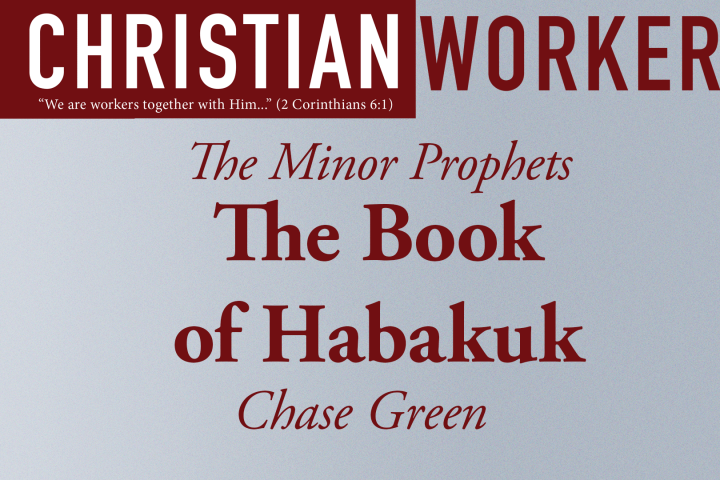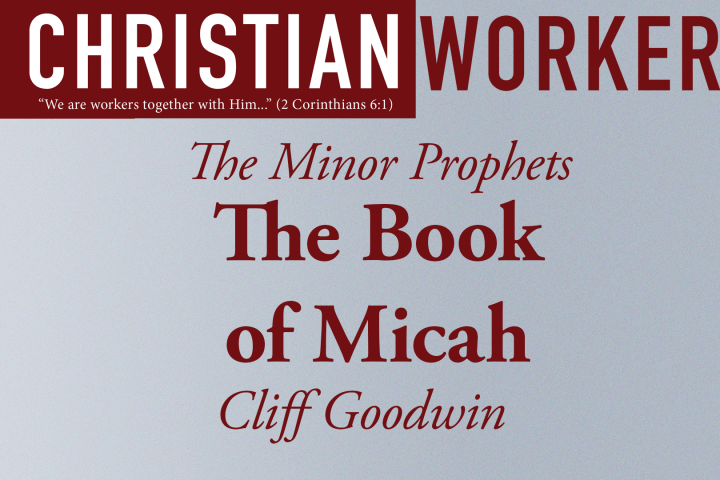Posts from October 2024
From the Director’s Desk (October 2024) – Trent Kennedy
It is amazing what a little understanding of the textual background (history, context, and geography) can do to help us see the Word of God with more clarity. One example of this is found in the famous Old Testament passage of Joshua 24:15. “And if it seem evil unto you to serve Jehovah, choose you this day whom ye will serve; whether the gods which your fathers served that were beyond the River, or the gods of the Amorites, in…
The Book of Malachi – Bryan Hodge
Malachi is a post-exilic book (Mal. 1:3 cf. Jer. 49:7-22; Eze. 25:12-14). The children of Israel have returned from captivity. The temple has been rebuilt (Mal. 1:6-ff). Time has passed, perhaps 100 years. Problems existed. Certain issues in this book seem to line up with the book of Nehemiah, e.g. marriage (Mal. 2:10-11, cf. Neh. 13:23ff), care of the poor (Mal. 3:5, cf. Neh. 5:1ff), and giving (Mal. 3:8; Neh. 10:32-39; 13:10ff). The book of Malachi is written to motivate…
The Book of Haggai – Jordan Moore
As the short, two-chapter book of Haggai opens, we don’t read of God’s people being condemned for worshipping false gods. Nor do we read of them being given over to sexual deviance, intermarrying with foreign nations, or casually practicing divorce. Still yet, they aren’t found to be committing heinous crimes against one another, stealing from one another, or even so much as just being generally unkind to one another. No – after Cyrus, King of Persia, had declared that the…
The Book of Zephaniah – Johnie Scaggs, Jr
The book of Zephaniah contains many Biblical principles that we should learn. The name Zephaniah means “Jehovah shall protect.” It comprises three chapters and only has fifty-three verses. Still, the power behind these few chapters and verses ought to shake the very foundations of one’s soul as you read about the Lord’s anger because of Judah’s unrighteousness. “That day is a day of wrath, A day of trouble and distress, A day of wasteness and desolation, A day of darkness…
The Book of Zechariah – Neal Pollard
The author of the longest book in the library of the Minor Prophets is identified in the first book of his prophecy as “the son of Berechiah, son of Iddo” (1:1). Only Zephaniah’s lineage is more exhaustively traced than Zechariah’s. His name means “God remembers,” and this takes on significance when the message of the book is considered. Studying Ezra and Nehemiah, one can deduce that Zechariah is of a priestly lineage (Ezra 5:1; 6:14; Neh. 12:4,16). Matthew 23:35 reveals…
The Book of Habakuk – Chase Green
Little is known about the prophet Habakkuk, whose name is only mentioned twice in Scripture (Hab. 1:1 and 3:1) and of whom no biographical information is given. His prophecy, set shortly before the time of the Babylonian captivity, is unique and interesting in that it includes a questioning of God and also a song in its final chapter. The book opens in chapter 1 with Habakkuk questioning God: “O Lord, how long shall I cry, and You will not hear?…
The Book of Nahum – Cody Westbrook
The name “Nahum” means comfort, compassion, or consolation. No doubt, the ancient Ninevites would find that ironic. Nahum has been called “The Single Minded Prophet” because his one topic was the destruction of the Assyrian capital, Nineveh. No comfort or consolation for them could be found in that message. Nahum wrote just before the destruction of Nineveh at the hand of the Medes and Persians in 612 BC. He was a contemporary with Jeremiah, Zephaniah, and Habakkuk. Ironically, Nahum was…
The Book of Micah – Cliff Goodwin
Dark times prevail, spiritually speaking, when God’s people allow themselves to become distracted and preoccupied with economic prosperity and political maneuvering. Goals and priorities become increasingly temporal in nature—tied to this present life and all the circumstantial trappings of it. Mix in military threats from surrounding enemies, and God’s people can be tempted to take matters in their own hands and forget about the power of their God. Such was the case in Micah’s day. The Assyrian Empire was the…
We Should All Be Experts
Malcom Gladwell popularized “The 10,000 hour rule” in his book, Outliers. The idea is that anyone can become an expert in any given field provided they dedicate 10,000 hours of practice to it. Though science has shown the rule to be more like a guideline, it still points to an objectively true principle. That is, that a person who dedicates vast amounts of time and energy to pursuing proficiency in a given area, very likely will find it. He may…
Love Your Enemies
Jesus said, “If the world hates you, you know that it hated Me before it hated you. If you were of the world, the world would love its own. Yet because you are not of the world, but I chose you out of the world, therefore the world hates you” (John 15:18-19). How should we deal with those who hate and fight against us? Two passages from the Sermon on the Mount are worthy of our consideration. First, consider Matthew…
Drink Like the Dogs!
Throughout history, the Lord has chosen to accomplish His will in some very unorthodox ways. The occasion of Judges 7:1-8 is a prime example. As Jehovah prepared Gideon to wage war against the Midianites, He commanded a strange way of mustering his troops. Israel’s army of 32,000 was scaled to a mere 300 men. Twenty-two thousand left for fear (Judges 7:3) and the rest were removed because of how they drank. As they arrived at the water the Lord commanded,…
Greater than Gold
The 19th Psalm is one of the most memorable in the Psalter. The first 6 verses magnificently describe the general revelation of God in nature. It calls us to behold and stand in awe of the creative genius of Jehovah as we see His fingerprints all around us. But the God who created has also commanded, and this theme is taken up in the next portion of the Psalm (vss. 7-11). Note how God’s Word is described (vss. 7-9). The…

